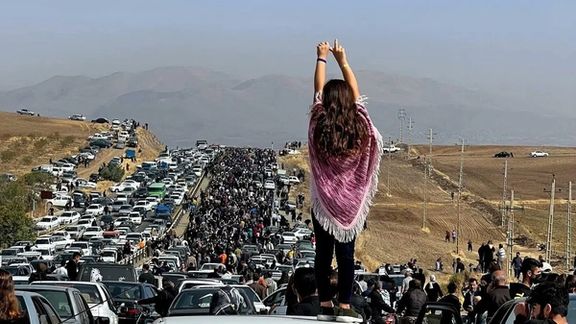US Awards Madeleine Albright Prize To Iranian Women Protesters

While the world celebrated the International Women's Day, with Iran in focus, the US bestowed the Madeleine Albright award on Iranian women.

While the world celebrated the International Women's Day, with Iran in focus, the US bestowed the Madeleine Albright award on Iranian women.
In a ceremony hosted by First Lady Jill Biden and Secretary of State Antony Blinken at the White House on Wednesday, US Ambassador to UN Linda Thomas-Greenfield presented the inaugural Madeleine Albright Honorary Group International Women of Courage Award to the women and girls in Iran, who embarked on months of grassroots rallies following the death of Mahsa Amini, the 22-year-old Iranian woman died in ‘hijab police’ custody.
The United States also honored 11 global women leaders -- some from countries hit by crises -- to mark International Women's Day and recognize those with "exceptional courage, strength, and leadership in advocating for peace, justice, human rights, gender equity and equality, often at great personal risk and sacrifice."
Earlier in the day, US State Department Spokesperson Ned Price announced the new annual award in honor of Former Secretary of State Madeleine Albright’s legacy and her championing of women’s rights and universal rights around. “Given her longstanding support for women’s empowerment and leadership, we can’t think of someone who exemplifies the goals and values of the IWOC Award better than Former Secretary Albright,” he said, adding, “We’re proud to recognize the women and girl protestors of Iran with the inaugural Madeleine Albright Group Honorary Award this year.”
Price said that over the course of the past six months, the world has witnessed the bravery, the determination, the resilience of the protesters in Iran, so many of whom are women, noting that the leadership of this movement is in some ways dominated by women as they are at the vanguard of this movement.
“We have seen the remarkable courage of these protesters, including these women who have taken to the streets at no shortage of personal risk to themselves," he added, highlighting that “They are in prison; they’ve been harassed; they’ve been injured. In too many cases, the regime has ended their lives prematurely for doing nothing more than exercising a right that is as universal to them as it is to women and girls here in this country.”
In a statement to mark the occasion, US President Joe Biden said, “ We see it in Afghanistan, where the Taliban bars women and girls from attending school and pursuing employment. We see it in Iran, where the regime is brutally repressing the voices of women who are courageously standing up for their freedom.”
This year’s International Women's Day saw activists holding demonstrations all over the world from Jakarta and Singapore to Istanbul, Berlin, Paris, Rome, Caracas, Montevideo, and so many others with a focus on Iran, embroiled in antigovernment protests, and Afghanistan, where girls are denied the right to education.
In London, protesters marched to the Iranian embassy in costumes inspired by the novel and television series "The Handmaid's Tale", while in Valencia, Spain, women cut their hair in support of the Iranian women.
In recent days, the Islamic Republic has faced renewed global pressure amid public anger over a wave of chemical attacks on girls in dozens of schools. The regime has arrested several people it accuses of connections to the poisonings as well as to "foreign-based dissident media".
Also on Wednesday, Farhan Haq, the deputy spokesperson for the United Nations secretary-general, said the UN is following the reports about poisoning among schoolchildren and the UN Country Team has offered support to speedily and accurately ascertain the facts of this issue. "It's important for the Iranian authorities to investigate this fully and transparently, but we'll continue to monitor what's going on there,” he said.
In a tweet on Wednesday, UNESCO urged thorough investigations and immediate actions to protect schools and facilitate the return of affected students in Iran to their safe and healthy classrooms. UNESCO Director-General Audrey Azoulay expressed deep concern “about the reported poisoning of schoolgirls in Iran over the past three months,” describing the attacks as “a violation of their right to safe education.”
The UK and the US, the European Union, and Australia issued sanctions on the Islamic Republic to mark International Women's Day. The UK targeted global violators of women’s human rights, including Iran's morality enforcing outfit and its top official, while the US imposed sanctions on Iranian officials and companies over serious human rights abuses.